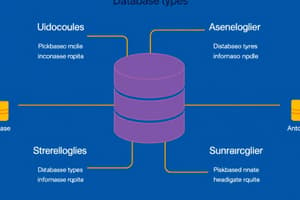Podcast
Questions and Answers
A collection of data, commonly called a ______, contains information about a particular enterprise.
A collection of data, commonly called a ______, contains information about a particular enterprise.
database
It maintains any information that may be necessary to the decision-making process involved in the ______ of that organization.
It maintains any information that may be necessary to the decision-making process involved in the ______ of that organization.
management
A generic and controlled approach is used to add new data and modify and retrieve existing data within the ______.
A generic and controlled approach is used to add new data and modify and retrieve existing data within the ______.
database
The data is structured so as to provide the basis for future application ______.
The data is structured so as to provide the basis for future application ______.
A ______ is often thought of as a repository of information needed to run certain functions in a corporation or organization.
A ______ is often thought of as a repository of information needed to run certain functions in a corporation or organization.
It may be possible to search the ______ to obtain answers to questions or information for planning purposes.
It may be possible to search the ______ to obtain answers to questions or information for planning purposes.
A database management system provides centralized control of the ______
A database management system provides centralized control of the ______
Database Abstraction hides some details of how the data is ______ and maintained
Database Abstraction hides some details of how the data is ______ and maintained
The different levels of the database are implemented through three ______
The different levels of the database are implemented through three ______
Data independence proves beneficial when there are frequent changes to the ______
Data independence proves beneficial when there are frequent changes to the ______
Database Schema represents the structure, types of data, constraints, and relationships between the ______
Database Schema represents the structure, types of data, constraints, and relationships between the ______
Metadata is known as the data about the ______
Metadata is known as the data about the ______
Flashcards are hidden until you start studying
Study Notes
Database System
- A database system is a computer-based record-keeping system that stores information about a particular enterprise, supporting decision-making processes.
- It maintains all necessary information for the management of an organization.
Purpose of Database
- The purpose of a database is to serve as many applications as possible, providing a repository of information needed to run certain functions in a corporation or organization.
- It allows retrieval, modification, and continuous updating of data for operational control and planning purposes.
Limitations of File-Processing System
- A typical file-processing system has several major limitations, including:
- Data redundancy
- Data inconsistency
- Maladaptive data
- Non-standard data
- Insecure data
- Incorrect data
Database Management System
- A database management system (DBMS) provides centralized control of data, addressing the limitations of file-processing systems.
Database Abstraction
- A database provides users with only necessary information, hiding details of data storage and maintenance.
- Complexity of databases is hidden through multiple levels of abstraction, facilitating user interaction.
Database Layers
- The three levels of abstraction are implemented through three layers:
- Each layer can be changed without affecting other levels, thanks to data independence.
Key Database Concepts
- Database Schema: A design of the database, representing structure, data types, constraints, and relationships between tables.
- Data Constraints: Restrictions on the type of data stored in table columns, defined during table creation.
- Data Dictionary or Metadata: Information about the data, including database schema and constraints, stored by the DBMS.
- Database Instance: A complete database environment, including memory structures and background processes, used to access database files.
- Query: A request to access or manipulate data from the database, written by users.
- Data Manipulation: The ability to insert, delete, and update data using three main operations.
- Data Engine: The underlying component that manages data storage and retrieval.
Studying That Suits You
Use AI to generate personalized quizzes and flashcards to suit your learning preferences.




